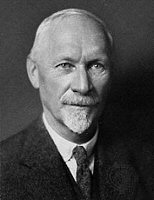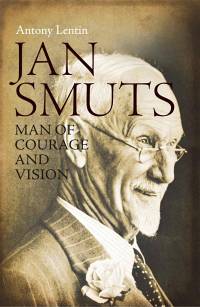
Jan Smuts
1870-1950
He returned to South Africa in 1895 and, after a short stay in Cape Town, he became the state attorney of Johannesburg in 1898 and a member of Paul Kruger's government. In 1899 Smuts seems to have contributed to Een Eeu van Onrecht (A Century of Wrong), a book that explained the Boer case against Britain.
In the Second Boer War (1899-1902) Smuts was a commandant in the Boer Army and involved in skirmishes against the British. Nevertheless, he was of the opinion that South Africa's future lay in co-operation with Britain.
During the war, Smuts had formed a close friendship with Louis Botha, who later became Prime Minister. After the elections of February 1907, Smuts joined Botha's cabinet in a succesion of posts, including defence minister. In May 1910, the Union of South Africa was formed under a constitution Smuts helped to write.
On the outbreak of the First World War in 1914, Prime Minister Botha offered military assistance to Britain. Jan Smuts founded the South African Defence Force and led South Africa's successful campaign in German East-Africa. (He also used the Defence Force to quell any opposition to the Union's support of the British and rebellions in the mines).
He was invited to join the British War cabinet by Lloyd George in March 1917, and a year later he helped create the Royal Air Force.
At the Paris Peace Conference, Botha and Smuts advocated a reconciliation with Germany.
After Botha's death in 1919, Smuts was elected Prime Minister. He lost power in the elections in 1924 but returned as deputy prime minister in 1933, and prime minister (1939-48).
Smuts and Winston Churchill were colleagues during the First World War. After the Second World War Smuts played an influential role in Churchill's wartime government. and he was made an honorary Field Marshal in the British Army in September 1941.
In May 1945 Smuts was in San Francisco working with other delegates on the United Nations Charter.
When he lost the South African general election of 1948 (which brought the National Party to power), Smuts was elected Chancellor of Cambridge University and held the post until his death two years later.
Jan Smuts was an amateur botanist and has a grass type, growing at Irene, named after him.
He was married, in 1897, to Isabella (Issie) Margaretha Krige - in later life known as "Ouma". Issie was from Stellenbosch, where her father, Japie Krige, was the owner of a students boarding house. She lived in Dorp Street and near the house where Jan Smuts lived. They had six children. Jan Smuts died on 11 September 1950 at his homestead in Irene near Pretoria.
Books:
Holism and Evolution, London: Macmillan, 1926
1870-1950
Author of a book on Holism
Prime Minister of the South African Union, 1919 - 1924 and 1939-1948
"One of the greatest intellectuals this country has ever produced and a public figure who dominated the first half of the 20th century in SA."Jan Christian Smuts was born on 24 May 1870 on the farm Ongegund near Riebeeck West, Cape. He was a brilliant student and studied law at Victoria College, Stellenbosch, and at Christ's College in Cambridge (LLB 1894). Smuts became the first student in Cambridge University's 600 year history to have achieved a double first ( double cum laude) in the law tripos.
He returned to South Africa in 1895 and, after a short stay in Cape Town, he became the state attorney of Johannesburg in 1898 and a member of Paul Kruger's government. In 1899 Smuts seems to have contributed to Een Eeu van Onrecht (A Century of Wrong), a book that explained the Boer case against Britain.
In the Second Boer War (1899-1902) Smuts was a commandant in the Boer Army and involved in skirmishes against the British. Nevertheless, he was of the opinion that South Africa's future lay in co-operation with Britain.
During the war, Smuts had formed a close friendship with Louis Botha, who later became Prime Minister. After the elections of February 1907, Smuts joined Botha's cabinet in a succesion of posts, including defence minister. In May 1910, the Union of South Africa was formed under a constitution Smuts helped to write.
On the outbreak of the First World War in 1914, Prime Minister Botha offered military assistance to Britain. Jan Smuts founded the South African Defence Force and led South Africa's successful campaign in German East-Africa. (He also used the Defence Force to quell any opposition to the Union's support of the British and rebellions in the mines).
He was invited to join the British War cabinet by Lloyd George in March 1917, and a year later he helped create the Royal Air Force.
At the Paris Peace Conference, Botha and Smuts advocated a reconciliation with Germany.
After Botha's death in 1919, Smuts was elected Prime Minister. He lost power in the elections in 1924 but returned as deputy prime minister in 1933, and prime minister (1939-48).
Smuts and Winston Churchill were colleagues during the First World War. After the Second World War Smuts played an influential role in Churchill's wartime government. and he was made an honorary Field Marshal in the British Army in September 1941.
In May 1945 Smuts was in San Francisco working with other delegates on the United Nations Charter.
When he lost the South African general election of 1948 (which brought the National Party to power), Smuts was elected Chancellor of Cambridge University and held the post until his death two years later.
Jan Smuts was an amateur botanist and has a grass type, growing at Irene, named after him.
He was married, in 1897, to Isabella (Issie) Margaretha Krige - in later life known as "Ouma". Issie was from Stellenbosch, where her father, Japie Krige, was the owner of a students boarding house. She lived in Dorp Street and near the house where Jan Smuts lived. They had six children. Jan Smuts died on 11 September 1950 at his homestead in Irene near Pretoria.

Books on Jan Smuts:
SB Spies, Memoirs of the Boer war: Jan Smuts
Antony Lentin
Jan Smuts, Jonathan Ball Publishers
Holism and Evolution, London: Macmillan, 1926
Smuts sent a copy of Holism to Einstein, because he had a section on relativity theory in it. In his reply Einstein commented that Smuts was one of only a handful of people in the world who understood the theory.
War-Time Speeches, A Compilation of Public Utterances in Great Britain